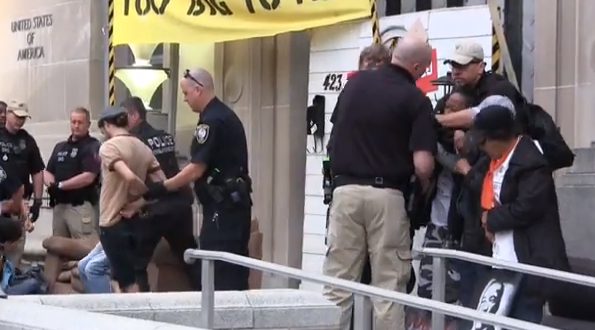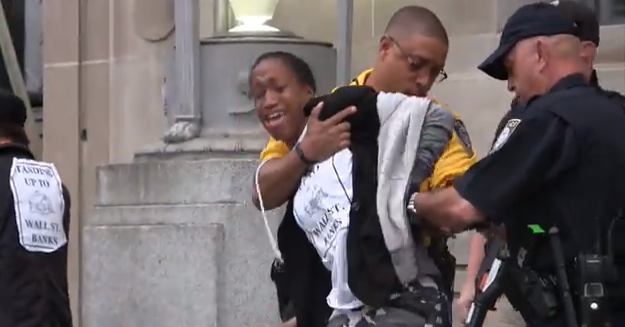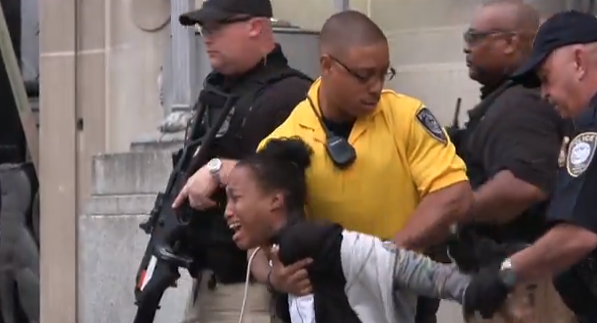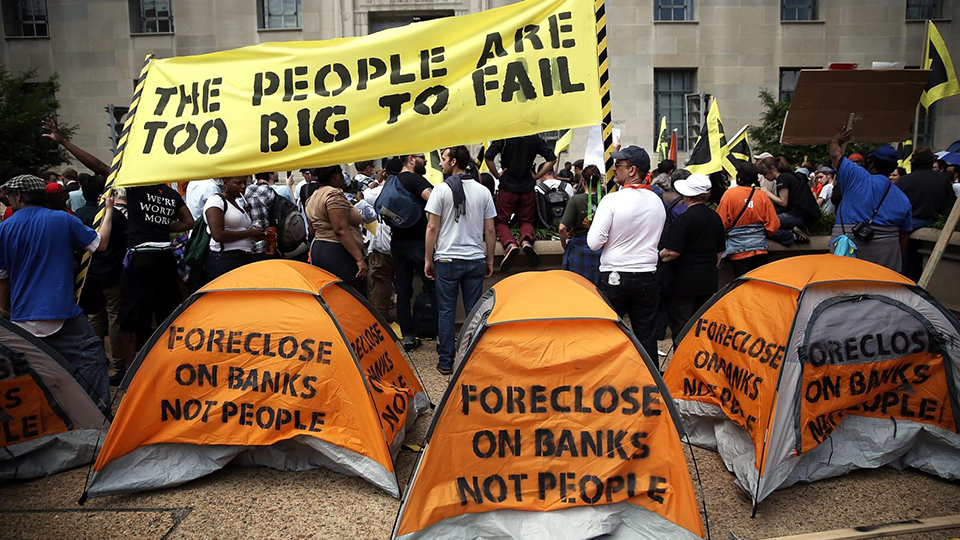A two-day long housing protest outside the Department of Justice this week has resulted in nearly 30 arrests and several instances of law enforcement unnecessarily using tasers on activists, according to eye-witnesses. The action – which was organized by a coalition of housing advocacy groups, including the Home Defenders League and Occupy Our Homes – called for Attorney General Eric Holder to begin prosecutions against the bankers who created the foreclosure crisis.
"Everyone here is fed up with Holder acknowledging big banks did really bad stuff but [saying] they're too big to jail," says Greg Basta, deputy director of New York Communities for Change, who helped organize the event. Holder has previously suggested that prosecuting large banks would be difficult because it could destabilize the economy. The attorney general recently tried to walk those comments back – but the conspicuous lack of criminal prosecutions of bankers tells another story, one that Rolling Stone's Matt Taibbi has written about extensively.
Alexis Goldstein, a former Wall Street employee and current Occupy Wall Street activist who was also at the event on Monday, agrees. "I want Eric Holder to uphold the rule of law, regardless of how much power the criminal has," says Goldstein. She says the lack of criminal prosecutions has created a "culture of immunity" that only gets further entrenched by the small settlements that banks now consider a cost of doing business. "There's no risk," she says, adding that the DOJ is effectively "incentivizing breaking the law."
Around 400 homeowners and 100 supporters took part in Monday's actions outside the DOJ, according to Basta. One of them was Vera Johnson, of Seattle. "I've been dealing with foreclosure issues for three years," says Johnson, just minutes after being released from the jail where she was held for over 24 hours for participating in this peaceful protest. Bank of America recently granted Johnson a loan modification after the media picked up on a Change.org petition that she started to save her home; this reprieve turned out to be a time bomb, as her rates were set to return to their original levels after four years. It's an all too common story, and Johnson went to Washington, D.C. to "join in solidarity" with others in similar situations.
Many of this week's protesters have been black and Latino homeowners, who were hit particularly hard by the foreclosure crisis. Mildred Garrison-Obi – a black woman from Stone Mountain, Georgia – was evicted from her home in 2012, though with the help of Occupy Our Homes she was able to return to it after four months of facing homelessness. "It was devastating," says Garrison-Obi, who was arrested in a related action held outside of a law firm where Holder was once a partner. "But I'm not alone."
Activists note with dismay that the government has been significantly harder on people who stage nonviolent demonstrations against Wall Street than it has on the crooked bankers responsible for the housing crisis. Goldstein and Basta both say they witnessed law enforcement using tasers on multiple protesters this week. Johnson says that several hours before her arrest, as she and others sat on planter boxes outside the DOJ, a Department of Homeland Security officer asked, "Do you want to get arrested?" and then, "Do you want to get tased?" Later, when she refused to unlock her arms with another protester after three warnings – hardly a violent act or a threat to public safety – she says she was tased from behind on her left arm. She turned around to see the same officer, who she recalls telling her, "That's what you get."
Carmen Pittman, an activist with Occupy Our Homes in Atlanta, suffered similar treatment at this week's protests. In video footage of her arrest, Pittman appears to have her arms interlocked with another protester.
Lawyers familiar with police codes of conduct note that this kind of passive resistance generally does not meet the official standards for when an officer can use a taser. "In a study of regulations around tasers, the National Institute of Justice found that most police departments do not allow taser use against someone who 'nonviolently refuses' a police command," says NYU law professor Sarah Knuckey, who co-authored a report on the suppression of the rights of Occupy activists. "The incident needs to be thoroughly investigated, there must be a public accounting of what happened and why, and any wrong-doing must be punished."
Zach Lerner, another activist with NYCC, displayed marks left on his torso after a taser had been used on him.
A spokesperson for the Washington, D.C. police department directed requests for comment to the Federal Protective Service, part of the Department of Homeland Security. Scott McConnell, an FPS spokesperson, said that "a number of individuals" had "breached a security barricade after repeated warnings to leave the area" and that there had been 27 arrests as of Tuesday morning; he declined to comment on the video of Pittman getting tased or on FPS's taser policy generally.
Monday and Tuesday's actions came as the DOJ falls under increasing criticism for its investigations of journalists – first seizing records that cover dozens of Associated Press reporters, and now targeting Fox News' James Rosen. Many media observers have found the Rosen case especially troubling, due to the fact that he was investigated under the theory that he engaged in a conspiracy with Stephen Kim – his source – to leak government information. This is the same theory that U.S. officials have used to go after Wikileaks, and if applied more widely, it would effectively criminalize the basic act of investigative reporting. Some see the Obama DOJ's war on whistleblowers and leakers – and now journalists – less as a means of protecting national security than a way to crack down on who controls information.
As journalists start to get the feeling that their profession is under attack by Obama's DOJ, that department is saying something entirely different – though just as clearly – to the nation's financial elite. "The message," says Goldstein, "is that you can get away with anything."
Originally published by Rolling Stone
3 WAYS TO SHOW YOUR SUPPORT
- Log in to post comments















